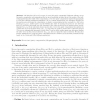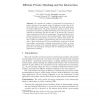150 search results - page 15 / 30 » Fair Secure Two-Party Computation |
STOC
2005
ACM
14 years 7 months ago
2005
ACM
We introduce the novel concept of covert two-party computation. Whereas ordinary secure two-party computation only guarantees that no more knowledge is leaked about the inputs of t...
CONCUR
2003
Springer
14 years 21 days ago
2003
Springer
Abstract. A contract signing protocol lets two parties exchange digital signatures on a pre-agreed text. Optimistic contract signing protocols enable the signers to do so without i...
PODC
2010
ACM
13 years 11 months ago
2010
ACM
Most protocols for distributed, fault-tolerant computation, or multi-party computation (MPC), provide security guarantees in an all-or-nothing fashion: If the number of corrupted p...
EUROCRYPT
2004
Springer
13 years 11 months ago
2004
Springer
We consider the problem of computing the intersection of private datasets of two parties, where the datasets contain lists of elements taken from a large domain. This problem has m...
ACSAC
2003
IEEE
14 years 24 days ago
2003
IEEE
The emergence of online games has fundamentally changed security requirements for computer games, which previously were largely concerned with copy protection. In this paper, we e...


